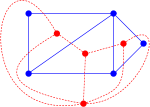|
|
When I read the subheading in a recent Scientific American article, it brought me back to some 18th century thoughts which I recently reviewed. The subheading of a piece by Clara Moskowitz’s that describes a new effort in theoretical physics reads:
Hundreds of researchers in a collaborative project called “It from Qubit” say space and […]
First, I would like to apologize for posting so infrequently these past few months. I have been working hard to flesh out a book proposal closely related to the perspective of this blog, and I will be focused on this project for a bit longer.
However, a TED talk filmed in Paris in May came […]
In 2011 John Horgan posted a piece on his blog, Cross Check (part of the Scientific American blog network), with the title, Why Information can’t be the basis of reality. There Horgan makes the observation that the “everything-is-information meme violates common sense.” As of last December (at least) he hadn’t changed his mind. He referred […]
A recent issue of New Scientist featured an article by Kate Douglas with the provocative title Nature’s brain: A radical new view of evolution. The limits of our current understanding of evolution, and the alternative view discussed in the article, are summarized in this excerpt:
Any process built purely on random changes has a lot […]
I’ve been reading Rebecca Goldstein’s Incompleteness: The Proof and Paradox of Kurt Gödel which, together with my finding David Mumford’s Why I am a Platonist, has kept me a bit more preoccupied, of late, with Platonism. This is not an entirely new preoccupation. I remember one of my early philosophy teacher’s periodically blurting out, “See, […]

I’m not sure what led me to David Mumford’s Why I am a Platonist, which appeared in a 2008 issue of the European Mathematical Society (EMS) Newsletter, but I’m happy I found it. David Mumford is currently Professor Emeritus at Brown and Harvard Universities. The EMS piece is a clear and straightforward exposition of […]
I think often about the continuity of things – about the smooth progression of structure, that is the stuff of life, from the microscopic to the macrocosmic. I was reminded, again, of how often I see things in terms of continuums when I listened online to a lecture given by Gregory Chaitin in 2008. In […]

Can the presence of intelligent behavior in other creatures (creatures that don’t have a nervous system comparable to ours) tell us something about what ideas are, or how thought fits into nature’s actions? It has always seemed to us humans that our ideas are one of the fruits of what we call our ‘intelligence.’ And […]
In a recent Scientific American article, the late physicist Victor Stenger, along with authors James A. Lindsay and Peter Boghossian argue that, while not acknowledged as such, some interpretations of quantum mechanics are implicitly platonic (with a lower-case p).
We will use platonism with a lower-case “p” here to refer to the belief that the […]
A recent post on Mind Hacks challenged the perspective outlined in a NY Times op-ed by psychologist Gary Marcus with the title Face It, Your Brain Is a Computer. The title of Marcus’ piece may be misleading. The brain/computer analogy that he proposes is more a strategy than a theory. But the rejection of brain/computer […]
|
|




Recent Comments